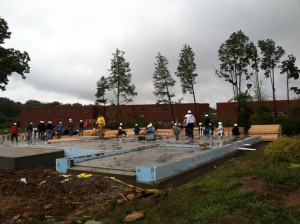Rain clouds and chilly winds were no match for the warm heart of Paul Manyok Saturday morning, Oct. 6, as a crew of Habitat for Humanity volunteers began building a new house for him and his family.
Manyok, a 2011 Lipscomb graduate, is one of the Lost Boys of Sudan creating a new life for himself in Nashville. He came to the United States in September 2003 and became a U.S. citizen in 2008.
With his new home Manyok will be able to offer his three young daughters something he didn’t experience as a child: safety.
“I’m very excited,” Manyok said, explaining the significance of the day. “It means a lot to me—security and safety for my children, somewhere where they can play, a place to call home.”
At age 5, Manyok fled, with other Lost Boys, from the violence of civil war ravaging his home nation. The Lost Boys Foundation reports that 20,000 young boys left their families and homes in South Sudan in 1987.
“Wandering for years, they walked more than a thousand miles, half of them dying before reaching a Kenyan refugee camp,” the Foundation’s website explains.
According to the Foundation, at least 150 of the Lost Boys have made the Nashville area their new home.
Despite shivering in the chilly 46-degree weather, Elizabeth Manyok, Paul’s wife who is also Sudanese, wore a beaming smile as she waited on the street in front of where her family’s home will stand.
Using her husband as a translator, she shared her appreciation.
“I thank Habitat for Humanity, Wells Fargo bank, THDA and all of the volunteers that have helped us,” she said. “I’m very happy to be a homeowner.”
 Adam Hesselrode, a friend of the family who attends church with them at Tusculum Church of Christ, said working with Habitat volunteers – which is required of all new homeowners – is beneficial for the Manyoks because it allows them to take special ownership in their new home.
Adam Hesselrode, a friend of the family who attends church with them at Tusculum Church of Christ, said working with Habitat volunteers – which is required of all new homeowners – is beneficial for the Manyoks because it allows them to take special ownership in their new home.
“Usually when people get their own house, that helps them establish their identity in a community,” he said. “Something I really like about Habitat is it’s not just a gift, but it’s something where they contribute as well, with their labor, with their funds. So, that’s going to help them have even more ideal ownership and involvement.”
Tom Hallquist, another friend and a professor at Belmont and Columbia State, has traveled to Africa and worked with the Lost Boys there.
Hallquist agreed with Hesselrode, saying it’s good for Manyok to be able to participate in the construction process.
“He doesn’t want charity, he wants to earn it,” Hallquist said. “This has given him the opportunity to earn it, not to be given anything.”
Hallquist said those who’ve always lived in America can’t really grasp Manyok’s endurance and courage.
“We cannot comprehend…how these little kids were forced to go to Ethiopia to the refugee camp and then to Northern Kenya. We can’t comprehend little kids drawing lots at night to see who could sleep in the middle,” he said, explaining that children who slept on the outside were often dragged away by wild animals.
“These are incredible people who have suffered tremendous hardships,” he said. “We complain because our lunch is a little cold.”
“What amazes me about the mindset of people like Paul is that they look to the future and not the past,” Hallquist continued. “They feel that they are so blessed for the opportunities they have and will have. … Their vision for the future is incredible.”
Paul Anderson, an elder at Tusculum Church of Christ, said owning a home will allow the Manyoks to “put down roots.”
“As they assimilate into American culture, this is just a great step for them,” he said. “They’ve been here a long time, but it’s just an incredible blessing today as they begin this part of their lives.”
Every weekend this month, volunteers will be working on the Manyoks’ home, hoping to complete the project by Oct. 28 for a dedication ceremony.
The Manyoks’ home is one of 15 houses currently being built in an Antioch neighborhood. Chip Wilson, Habitat’s construction director, said he thinks this is probably the most houses Nashville’s Habitat has done in one location at the same time.
After introducing the volunteer groups—including Lipscomb’s softball and cheerleading teams—and the homeowners to everyone involved with the 15 sites, Wilson specifically mentioned Paul Manyok’s enthusiasm.
“Paul has been really excited,” Wilson said. “He’s been out here taking pictures since before the foundation was laid.”
According to Robert Duvall, a councilman for District 33 where the 15 houses are being built, said Habitat’s work is also bringing new life to a financially troubled community.
“We had more bankrupt subdivisions than any other area in Davidson County, and this community needed to come back together,” Duvall said.
For the homeowners, Duvall said this is “a moment of joy and pride.” He added that the project is an example of the good that comes when people work together, noting that volunteers from across the United States and various parts of Davidson and Rutherford counties were present.
“This is what America is all about,” he said. “This is what Council District 33 is all about. Council District 33 is a very blended community. We’re proud to live here and be a part of it.”

